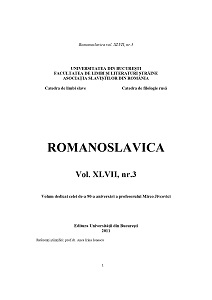Sinhronizacija sa dominantnim kulturama i pitanje recepcije
Synchronization with dominant cultures and the question of reception
Author(s): Mariana Dan, Minerva Trajlovic-KondanSubject(s): Romanian Literature, Serbian Literature, Sociology of Culture, Ethnic Minorities Studies, Sociology of Literature
Published by: Editura Universităţii din Bucureşti
Keywords: Balkan literature and culture; dominant/non-dominant culture; circulation and reception; synchronization; Maria Todorova; mentality; inferiority complex; transition; cultural values;
Summary/Abstract: Nowadays, ethnic minority authors are free to write their works in their mother tongue, without making any compromise regarding the ideology of the dominant culture. However, the act of writing itself does not ensure an adequate circulation and reception of their texts, for which translation and presence in mass media are needed. The poor circulation and reception of authors belonging to non-dominant cultures is to be noticed not only on national levels, but also on larger scales, when the globally non-dominant cultures are considered. While considering the Romanian ethnic minority writers of Vojvodina (Serbia), the Romanian diaspora abroad, and/or the Romanian national literature, one can notice that both the process of circulation and reception of books by Romanian authors is conditioned by the relation dominant – non-dominant culture, in which Romanian literature, written in Romanian, is culturally non-dominant. While the Romanian ethnic minority literature (including Romanian diaspora) is non-dominant on national levels, the Romanian national literature is non-dominant on the global scale, and therefore the process of its reception and synchronization follows the same pattern of all the countries belonging to Southeastern Europe. This relation dominant - non-dominant culture is here analyzed in terms of language, mass communication, financial support and mentality, and is relevant for the whole region. The paradox is that, in spite of today's freedom from ideological factors, and the theoretically equal chances of all literatures, the literatures of this region still don't have „equal chances‟ of mass communication and reception. The only difference that can be made is the fact that the cultural polarity dominance-non-dominance has shifted from the national to the global level. Nowadays, the minority and majority literatures of these countries have equally become „peripheral‟, as the centre of „dominance‟ is no longer within the national borders, but on the global level. Therefore, books written in widely spoken languages, especially those used in the economically dominant countries have far better chances of reception (i.e Cioran, Eliade, Ionesco became known when they moved to France and gave up entirely [or partially as in Eliade's case] writing in Romanian). Even the countries belonging to the Balkan region, get acquainted with the literature of the neighbouring countries if the books have been already published in the West. This fact is one of the main reasons why cross-cultural communication in the South-Eastern European region is feeble. In our opinion, nowadays this phenomenon is not to be merely related to the mentality of the intelligentsia of the respective countries, as M. Todorova puts it, but to the compulsory synchronization of the countries of this area with the West. The process, known as „transition‟ implies fundamental changes within the institutional structure of these countries, including the institution of culture. This fact implicitely means that the culture of the respective countries is considered as inferior, not only in terms of its institutional organization, but also in terms of its „content‟, as synchronization (or transition) is generally understood as the synchronization of the „periphery‟ with the „centre‟, as evolution from „inferior‟ to „superior‟. Many of the representants of the intelligentsia of the Balkan countries, might envisage, as M. Todorova did, that facts in culture cannot be judged by economic, political, ideological and administrative criteria, but by axiological ones. However, the voices of the respective intellectuals, pointing to any cultural values of the region (including literature), are not heard, for the same reasons (analyzed in this paper) for which reception and mass communication are generally feeble in this area. In other words, being economically non-dominant, these cultures are equally culturally non-dominant. Therefore, synchronization with the western dominant culture does not necessarily imply reception. It is the dominant countries who establish the way in which „the others‟ must become similar to the „dominant model‟ and the way they should not, while undergoing the process of synchronization / transition. The question remains open whether national values will be preserved at all, or will fade away in time during the process. Moreover, the ideological dominance of culture is more familiar to the South-Eastern European countries than it is to the West, and so all that remains for the Balkan intelligentsia to say (in French) would be: „la même Jeannette autrement coiffée“, which, in this case, the French themselves might not quite understand, after all ...
Journal: Romanoslavica
- Issue Year: XLVII/2011
- Issue No: 3
- Page Range: 197-209
- Page Count: 13
- Language: Serbian

